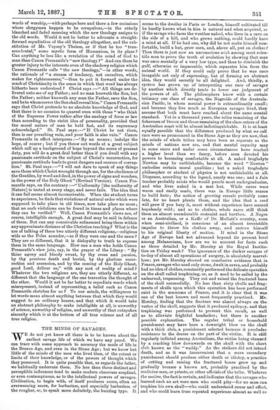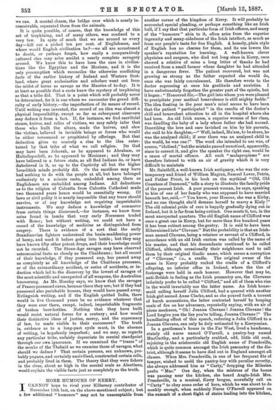THE MINDS OF SAVAGES.
WE do not yet know all there is to be known about the earliest savage life of which we have any proof. We can trace with some approach to accuracy the mode of life in the Bronze Age, and even in the Stone Age ; but we know but little of the minds of the men who lived then, of the extent or limits of their knowledge, or of the powers of thought which they possessed. It is quite possible that, as regards the latter, we habitually underrate them. No leas than three distinct and perceptible influences tend to make modern observers sceptical, or even contemptuous, as to the intellectual powers of savages. Civilisation, to begin with, of itself produces scorn, often an overweening scorn, for barbarism, and especially barbarism of the rougher, or, to speak more definitely, the hunting type. It seems to the dweller in Paris or London, himself cultivated till he hardly knows what in him is natural and what acquired, as if the savage who faces the weather naked, who lives in a save on the side of a hill, and who grows nothing, could hardly have a mind at alL If he had one, why did he not make himself com- fortable, build a hut, grow corn, and, above all, put on clothes P Then there is just now an unconscious wish among most scien- tific men to prove the truth of evolution by showing that man was once mentally of a very low type, and thus to diminish the golf, otherwise so impassable, which separates him from the animal world. If they could only prove that lie was once incapable not only of expressing, but of forming an abstract idea, they would secretly be all delighted. And, thirdly, a system has grown up of interpreting one race of savages by another which directly tends to lower our judgment of the powers of all. The philosophers know with a certain intimacy one class of savages, the Negroids of the Australa- sian Pacific, in whom mental power is extraordinarily small; and because they live much as European savages lived, they assume that both must have reached about the same mental standard. Yet in a thousand years, the relics remaining of the fishermen of Devon and those remaining of the clam•eaters of the Australian coast will be almost indistinguishable. It is at least equally possible that the difference produced by what we call race were as pronounced in the Stone Age as they are now, that the minds of whole tribes may have been as separate as the minds of nations now aro, and that mental capacity may in some races and under some circumstances have reached a higher level than we fancy, before man devoted his powers to becoming comfortable at all. A. naked troglodyte Newton may be unthinkable, because the word " Newton " embodies certain moral qualities ; but a naked troglodyte philosopher or student of physics is not unthinkable at all. Diogenes, according to the legend, nearly was one ; and a Jain teacher probably exists who would puzzle most undergraduates, and who lives naked in a mat hut. While caves were warm and easily made, there was in Europe little reason to build huts; the notion of growing cereals probably came late, for no beast plants them, and the idea that a seed will grow if you bury it, must without experience have seemed hopelessly wild ; and as to clothes, whole races still think them an almost unendurable restraint and burthen. A Negro or an Australian, or a Kaffir of Dr. Moffatt's country, even when semi-civilised, is conscious of an almost irresistible impulse to throw his clothes away, and restore himself to his original liberty of motion. If mind in the Stone Age of Europe had not advanced beyond its present level among Melanesians, how are we to account for facts such as those detailed by Mr. Horsley at the Royal Institu- tion on Friday week ? The ignorance of the darker savages of to-day of almost all operations of surgery, is absolutely marvel- lous; yet Mr. Horsley showed on conclusive evidence that in France,savages who need only stone, dwelt in caves, and probably had no idea of clothes, constantly performed the delicate operation on the skull called trephining, or, as it used to be called by the unlearned, trepanning. They cut and raised the fractured bone of the skull successfully. No less than sixty skulls and frag- ments of skulls upon which this operation has been performed exist in the museums of France, and it is clear that it was one of the best known and most frequently practised. Mr. Horsley, finding that the fracture was almost always on the vertex of the skull, suggests that it produced epilepsy, and that trephining was performed to prevent this result, as well as to alleviate frightful headaches; but there is another possible explanation. The regular tribal or household punishment may have been a downright blow on the skull with a thick club, a punishment selected because it precludes resistance to the decree on the part of the victim. It is still regularly inflicted among Australians, the victim being stunned by a cracking blow downwards on the skull with the short club known as the " waddy." As the strikers did not intend death, and as it was inconvenient that a mere secondary punishment should produce either death or idiotcy, a practice of cutting and raising the fractured bones grew up and gradually became a known art, probably practised by the medicine-men, or priests, or other officials of the tribe. Whatever the motive, the fact is certain, and indicates that the savages who learned such an art were men who could pity—for no man can trephine his own skull—who could understand cause and effect, and who could learn from repeated experience almost as well as
we can. A. mental chasm, the bridge over which is nearly in- conceivable, separated them from the animals.
It is quite possible, of course, that the knowledge of this art of trephining, and of many others, was confined to a very few. In spite of much that we see around us every day—kill out a picked ten per cent, of Englishmen, and where would English civilisation be?—we all are accustomed to doubt, or perhaps forget, how easily a comparatively cultured clan may arise amidst a nearly complete savagery around. We know this to have been the case in civilisa- tions like the Egyptian and the Mexican, and it is the only presumption which reconciles the otherwise conflicting facts of the earlier history of Ireland and Western Scot- land, where great ecclesiastics and scholars went out from the midst of kerns as savage as the Maories of to-day. It is at least as possible that a caste knew the mystery of trephining as that a tribe did. That is a point which will probably never be determined, for it is one where we encounter the grand diffi- culty of early history,—the imperfection of its means of record. Until writing was invented, the record of an idea was almost a physical impossibility, except so far as subsequent observers may deduce it from a fact. If, for instance, we find sacrificial stones, knives, and relics of victims, we may safely infer that those who built the altars, made the knives, and slew the victims, believed in invisible beings or forces who would be either reverenced or propitiated by offerings. But that deduction gives us scarcely a clue to the idea enter- tained by that tribe of what we call religion. Its God may have been Jehovah, as he appeared to Abraham, or Huitzilopochtli, as he appeared to Mexicans ; and they may have believed in a future state, as all Red Indians do, or have disbelieved in it, as up to the Captivity all but the higher Israelitish minds probably did. Or the sacrifices may have had nothing to do with the people at all, but have belonged exclusively to a minute caste, embedded among them as Englishmen are embedded among Indians. All deductions as to the religion of Calcutta from Calcutta Cathedral made two thousand years hence would be essentially wrong. Of laws or civil polity it is nearly impossible that any trace should survive, or of any knowledge not requiring imperishable instruments. We may deduce a knowledge of commerce from certain things discovered,—for instance, we know from coins found in tombs that very early Norsemen traded with Rome; but without writing, we could not have a record of the knowledge of medicine as distinguished from surgery. There is evidence of a sort that the early Scandinavian fighters understood the brain-maddening power of hemp, and used it before going into battle ; but they may have known fifty other potent drugs, and their knowledge could not be recorded. The Stone-Age savages may have observed astronomical facts as closely as the Chalda3ans ; but all record of their knowledge, if they possessed any, has passed away as completely as all knowledge of the Chaldrean processes, or of the extraordinary accident, or series of accidents, or in- duction which led to the discovery by the lowest of savages of the most scientific and unexpected of all weapons, the Australian boomerang. As Mr. Horsley says, we know that the savages of France possessed caves, because there they are; but if they had possessed also perishable houses, they would have passed away. Extinguish writing, and if the English quitted India, there would in five thousand years be no evidence whatever that they were ever there, except, indeed, imperishable fragments of broken beer-bottles. Nothing that they have built would resist natural forces for a century ; and bow would their distinctive ideas of justice, mercy, and the supremacy of law, be made visible to their successors? The truth is, evidence as to a long-past cycle must, in the absence of writing, be hopelessly imperfect; and we may, as regards any particular tribe, unfairly depreciate its mental standpoint through our own ignorance. If we examined the " traces " of the monks of the Thebaid as we examine those of savages, what should we deduce ? That certain persons, sex unknown, pro- bably pagans, and certainly uncivilised, constructed certain cells, and probably lived in them. The theory that they were fishers in the river, about as high in the mental scale as Aleutians, would explain the visible facts just as completely as the truth.



































 Previous page
Previous page